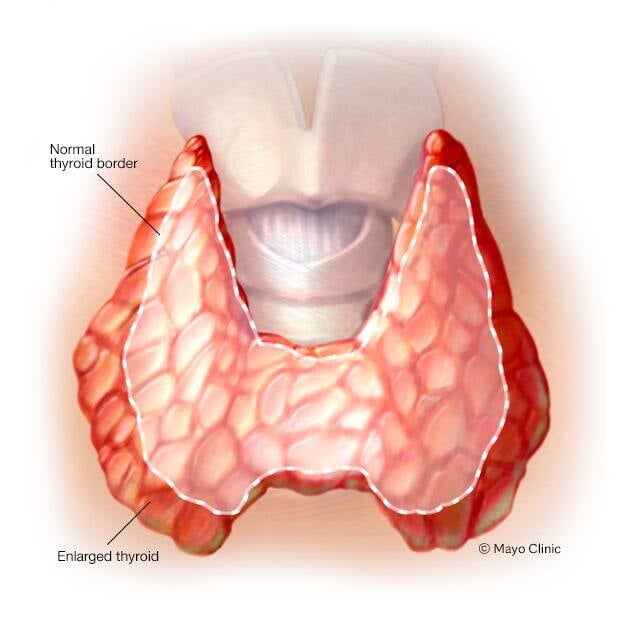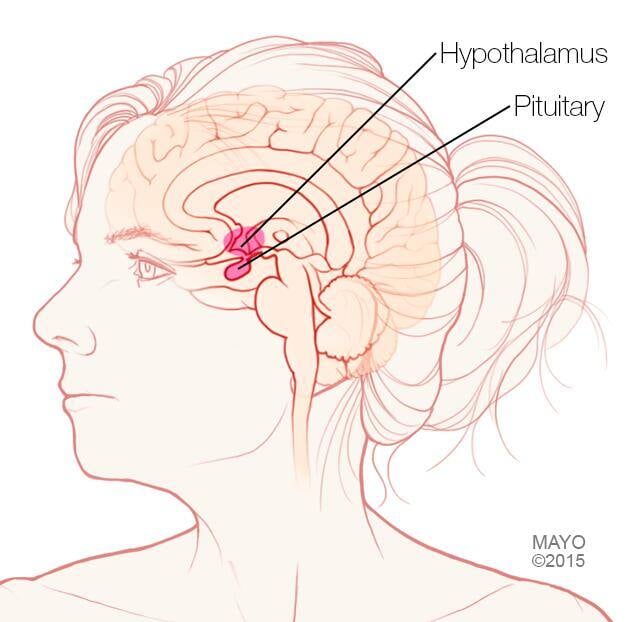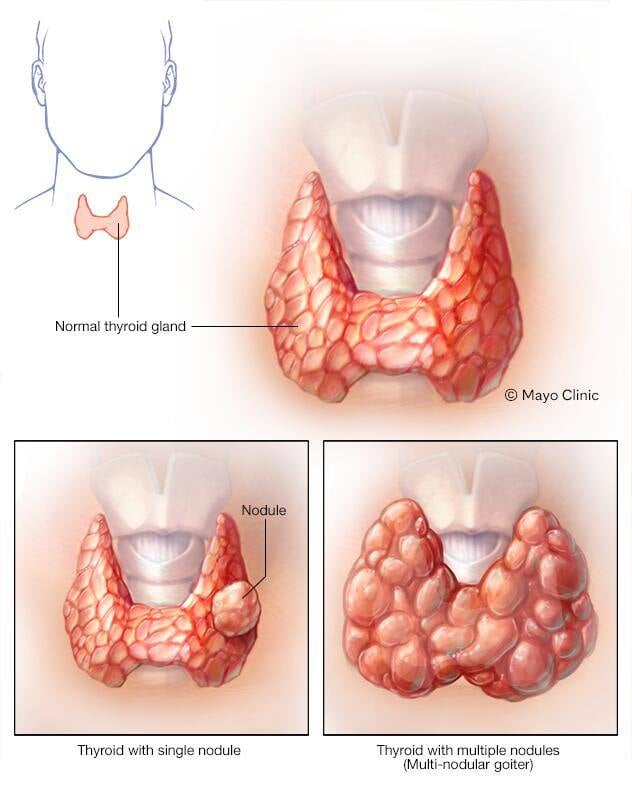Goiter
Overview

A goiter (GOI-tur) is the irregular growth of the thyroid gland. The thyroid is a butterfly-shaped gland located at the base of the neck just below the Adam's apple.
A goiter may be an overall enlargement of the thyroid, or it may be the result of irregular cell growth that forms one or more lumps (nodules) in the thyroid. A goiter may be associated with no change in thyroid function or with an increase or decrease in thyroid hormones.
The most common cause of goiters worldwide is a lack of iodine in the diet. In the United States, where the use of iodized salt is common, goiters are caused by conditions that change thyroid function or factors that affect thyroid growth.
Treatment depends on the cause of the goiter, symptoms, and complications resulting from the goiter. Small goiters that aren't noticeable and don't cause problems usually don't need treatment.
Symptoms
Most people with goiters have no signs or symptoms other than a swelling at the base of the neck. In many cases, the goiter is small enough that it's only discovered during a routine medical exam or an imaging test for another condition.
Other signs or symptoms depend on whether thyroid function changes, how quickly the goiter grows and whether it obstructs breathing.
Underactive thyroid (hypothyroidism)
Signs and symptoms of hypothyroidism include:
- Fatigue
- Increased sensitivity to cold
- Increased sleepiness
- Dry skin
- Constipation
- Muscle weakness
- Problems with memory or concentration
Overactive thyroid (hyperthyroidism)
Signs and symptoms of hyperthyroidism include:
- Weight loss
- Rapid heartbeat (tachycardia)
- Increased sensitivity to heat
- Excess sweating
- Tremors
- Irritability and nervousness
- Muscle weakness
- Frequent bowel movements
- Changes in menstrual patterns
- Sleep difficulty
- High blood pressure
- Increased appetite
Children with hyperthyroidism might also have the following:
- Rapid growth in height
- Changes in behavior
- Bone growth that outpaces expected growth for the child's age
Obstructive goiter
The size or position of a goiter may obstruct the airway and voice box. Signs and symptoms may include:
- Difficulty swallowing
- Difficulty breathing with exertion
- Cough
- Hoarseness
- Snoring
Causes


How the thyroid gland works
Two hormones produced by the thyroid are thyroxine (T-4) and triiodothyronine (T-3). When the thyroid releases T-4 and T-3 into the bloodstream, they play a role in many functions in the body, including the regulation of:
- The conversion of food into energy (metabolism)
- Body temperature
- Heart rate
- Blood pressure
- Other hormone interactions
- Growth during childhood
The thyroid gland also produces calcitonin, a hormone that helps regulate the amount of calcium in the blood.
How the thyroid is regulated
The pituitary gland and hypothalamus control the rate at which T-4 and T-3 are produced and released.
The hypothalamus is a specialized region at the base of the brain. It acts as a thermostat for maintaining balance in multiple body systems. The hypothalamus signals the pituitary gland to make a hormone known as thyroid-stimulating hormone (TSH).
The pituitary gland — located below the hypothalamus — releases a certain amount of TSH, depending on how much T-4 and T-3 are in the blood. The thyroid gland, in turn, regulates its production of hormones based on the amount of TSH it receives from the pituitary gland.
Causes of goiter
A number of factors that influence thyroid function or growth can result in a goiter.
- Iodine deficiency. Iodine is essential for the production of thyroid hormones. If a person does not get enough dietary iodine, hormone production drops and the pituitary gland signals the thyroid to make more. This increased signal results in thyroid growth. In the United States, this cause is uncommon because of iodine added to table salt.
- Hashimoto's disease. Hashimoto's disease is an autoimmune disorder, an illness caused by the immune system attacking healthy tissues. The damaged and inflamed tissues of the thyroid don't produce enough hormones (hypothyroidism). When the pituitary gland detects the decline and prompts the thyroid to create more hormones, the thyroid can become enlarged.
- Graves' disease. Another autoimmune disorder called Graves' disease occurs when the immune system produces a protein that mimics TSH. This rogue protein prompts the thyroid to overproduce hormones (hyperthyroidism) and can result in thyroid growth.
- Thyroid nodules. A nodule is the irregular growth of thyroid cells that form a lump. A person may have one nodule or several nodules (multinodular goiter). The cause of nodules is not clear, but there may be multiple factors — genetics, diet, lifestyle and environment. Most thyroid nodules are noncancerous (benign).
- Thyroid cancer. Thyroid cancer is less common than other cancers and generally treatable. About 5% of people with thyroid nodules are found to have cancer.
- Pregnancy. A hormone produced during pregnancy, human chorionic gonadotropin (HCG), may cause the thyroid gland to be overactive and enlarge slightly.
- Inflammation. Thyroiditis is inflammation of the thyroid caused by an autoimmune disorder, bacterial or viral infection, or medication. The inflammation may cause hyperthyroidism or hypothyroidism.
Risk factors
Anyone can develop a goiter. It may be present at birth or occur at any time throughout life. Some common risk factors for goiters include:
- A lack of dietary iodine. Iodine is found primarily in seawater and in the soil in coastal areas. In the developing world in particular, people who don't have enough iodine in their diets or access to food supplemented with iodine are at increased risk. This is rare in the United States.
- Being female. Women are more likely to develop a goiter or other thyroid disorders.
- Pregnancy and menopause. Thyroid problems in women are more likely to occur during pregnancy and menopause.
- Age. Goiters are more common after age 40.
- Family medical history. Family medical history of goiters or other thyroid disorders increases the risk of goiters. Also, researchers have identified genetic factors that may be associated with an increased risk.
- Medications. Some medical treatments, including the heart drug amiodarone (Pacerone) and the psychiatric drug lithium (Lithobid), increase your risk.
- Radiation exposure. Your risk increases if you've had radiation treatments to your neck or chest area.
Complications
A goiter itself usually doesn't cause complications. The appearance may be troublesome or embarrassing for some people. A large goiter may obstruct the airway and voice box.
Changes in the production of thyroid hormones that may be associated with goiters have the potential for causing complications in multiple body systems.
Diagnosis
A goiter is often discovered during a routine physical exam. By touching your neck, your health care provider may detect an enlargement of the thyroid, an individual nodule or multiple nodules. Sometimes a goiter is found when you are undergoing an imaging test for another condition.
Additional tests are then ordered to do the following:
- Measure the size of the thyroid
- Detect any nodules
- Assess whether the thyroid may be overactive or underactive
- Determine the cause of the goiter
Tests may include:
- Thyroid function tests. A blood sample can be used to measure the amount of TSH produced by the pituitary gland and how much T-4 and T-3 is produced by the thyroid. These tests can show whether the goiter is associated with an increase or decrease in thyroid function.
- Antibody test. Depending on the results of the thyroid function test, your health care provider may order a blood test to detect an antibody linked to an autoimmune disorder, such as Hashimoto's disease or Graves' disease.
- Ultrasonography. Ultrasonography uses sound waves to create a computerized image of tissues in your neck. The technician uses a wand-like device (transducer) over your neck to do the test. This imaging technique can reveal the size of your thyroid gland and detect nodules.
- Radioactive iodine uptake. If your health care provider orders this test, you are given a small amount of radioactive iodine. Using a special scanning device, a technician can measure the amount and rate at which your thyroid takes it in. This test may be combined with a radioactive iodine scan to show a visual image of the uptake pattern. The results may help determine function and cause of the goiter.
- Biopsy. During a fine-needle aspiration biopsy, ultrasound is used to guide a very small needle into your thyroid to obtain a tissue or fluid sample from nodules. The samples are tested for the presence of cancerous cells.
Treatment
Goiter treatment depends on the size of the goiter, your signs and symptoms, and the underlying cause. If your goiter is small and your thyroid function is healthy, your health care provider may suggest a wait-and-see approach with regular checkups.
Medications
Medications for goiters may include one of the following:
- For increasing hormone production. An underactive thyroid is treated with a thyroid hormone replacement. The drug levothyroxine (Levoxyl, Thyquidity, others) replaces T-4 and results in the pituitary gland releasing less TSH. The drug liothyronine (Cytomel) may be prescribed as a T-3 replacement. These treatments may decrease the size of the goiter.
- For reducing hormone production. An overactive thyroid may be treated with an anti-thyroid drug that disrupts hormone production. The most commonly used drug, methimazole (Tapazole), may also reduce the size of the goiter.
- For blocking hormone activities. Your health care provider may prescribe a drug called a beta blocker for managing symptoms of hyperthyroidism. These drugs — including atenolol (Tenormin), metoprolol (Lopressor) and others — can disrupt the excess thyroid hormones and lower symptoms.
- For managing pain. If inflammation of the thyroid results in pain, it's usually treated with aspirin, naproxen sodium (Aleve), ibuprofen (Advil, Motrin IB, others) or related pain relievers. Severe pain may be treated with a steroid.
Surgery
You may need surgery to remove all or part of your thyroid gland (total or partial thyroidectomy) may be used to treat goiter with the following complications:
- Difficulty breathing or swallowing
- Thyroid nodules that cause hyperthyroidism
- Thyroid cancer
You may need to take thyroid hormone replacement, depending on the amount of thyroid removed.
Radioactive iodine treatment
Radioactive iodine is a treatment for an overactive thyroid gland. The dose of radioactive iodine is taken orally. The thyroid takes up the radioactive iodine, which destroys cells in the thyroid. The treatment lowers or eliminates hormone production and may decrease the size of the goiter.
As with surgery, you may need to take thyroid hormone replacement to maintain the appropriate levels of hormones.
Self care
Your body gets iodine from your food. The recommended daily allowance is 150 micrograms. A teaspoon of iodized salt has about 250 micrograms of iodine.
Foods that contain iodine include:
- Saltwater fish and shellfish
- Seaweed
- Dairy products
- Soy products
Most people in the United States get enough iodine in a healthy diet. Too much iodine in the diet, however, can cause thyroid dysfunction.
Preparing for your appointment
If you've been diagnosed with a goiter, you're likely to have further tests to determine the cause. You might find it helpful to make a list of questions to ask your health care provider, such as:
- What caused this goiter to develop?
- Is it serious?
- What can be done to treat the underlying cause?
- I have other health conditions. How can I best manage them together?
- What are the alternatives to the main treatment that you're proposing?
- What will happen if I choose to do nothing?
- Will the goiter continue to get larger?
- How often should I have follow-up appointments?
- Will the treatment you're suggesting improve the appearance of the goiter?
- Will I have to take medication? For how long?



